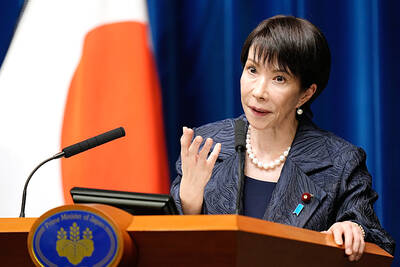The Civil Aeronautics Administration (CAA) yesterday released its cross-strait charter flight plan that will take effect on July 4, with Taipei Songshan Airport proving the most popular destination for the Chinese airlines and Kaohsiung the least popular.
None of the airlines has applied to land in Kaohsiung.
CAA Deputy Director-General Lin Shinn-der (林信得) told a press conference yesterday that although Xiamen Air was the only one of the six Chinese carriers to submit an official application, the other five had told the council which routes they are interested in.
China Southern Airlines said it wanted one round-trip flight between Guangzhou and Taoyuan International Airport next Friday, with the flight leaving Guanzhou at 7:20am.
Lin said almost all the Chinese airlines wanted flights to Songshan.
Chinese Eastern Air has asked if it could have two round-trip flights to Songshan next Friday, one from Nanjing and the other from Shanghai.
Songshan’s popularity means the council will have to shorten the intervals between two arriving or departing flights from two hours to one-and-a-half hours.
There will be a total of 16 round-trip flights for Taoyuan, 13 for Songshan, three for Taichung, one for Hualien and three for Makung.
As Songshan is also the only airport that has not had experience in handling a cross-strait charter flight, the council is planning a dress rehearsal next Wednesday, Lin said.
The council’s schedule shows that China Airlines (CAL) will have one round-trip flight between Taoyuan and Beijing and two round-trip flights between Taoyuan and Shanghai.
One of CAL’s Taoyuan-Shanghai flights, which is scheduled to leave at 7:30am on July 4, will become the first cross-strait charter flight leaving the country.
EVA Airways will have one round-trip flight between Taoyuan and Beijing, one between Taoyuan and Shanghai, and one between Taoyuan and Guangzhou.
Mandarin Airlines will have a round-trip flight between Taoyuan and Shanghai, one between Taoyuan and Guangzhou, one between Taichung and Xiamen and one between Magong and Xiamen.
Uni Air is planning for one Taoyuan-Shanghai round-trip, one Songshan-Shanghai flight and two Taichung-Xiamen flights.
TransAsia Airways will have one Songshan-Shanghai flight, one Hualien-Guangzhou flight and two Magong-Xiamen flights.
The CAA has approved Xiamen Air’s application for two round-trip flights between Xiamen and Songshan. The first flight will leave from Xiamen at 7:25am and land at Songshan at 9am.
Lin said the 18 round-trip flights departing from Taiwan have all been filled.
The council also provided ticket price information yesterday. A roundtrip ticket on the Taoyuan-Shanghai charters, for example, will cost between NT$14,175 and NT$17,629 before tax. That is slightly less than a regular flight via Hong Kong or Macau, which is usually between NT$14,429 and NT$20,000.
The Taoyuan-Beijing flights and Taoyuan-Nanjing flights will be more expensive than regular flights.
“The price of gas has risen by 20 to 30 percent as of this month,” Lin said, explaining why a shorter flight time has not translated into a cheaper ticket. “For now, there are not as many charter flights as those to Hong Kong or Macau, either.”
Lin said the council has a long-term plan to turn Songshan’s first terminal into an exclusive facility for cross-strait charters, while the second terminal would handle domestic flights.
Airlines are required to submit applications for new flight plans at least two weeks before the launch date.

The Ministry of Foreign Affairs (MOFA) yesterday voiced dissatisfaction with the Comprehensive and Progressive Agreement for Trans- Pacific Partnership (CPTPP), whose latest meeting, concluded earlier the same day, appeared not to address the country’s application. In a statement, MOFA said the CPTPP commission had "once again failed to fairly process Taiwan’s application," attributing the inaction to the bloc’s "succumbing to political pressure," without elaborating. Taiwan submitted its CPTPP application under the name "Separate Customs Territory of Taiwan, Penghu, Kinmen and Matsu" on Sept. 22, 2021 -- less than a week after China

THE GOOD WORD: More than 100 colleges on both sides of the Pacific will work together to bring students to Taiwan so they can learn Mandarin where it is spoken A total of 102 universities from Taiwan and the US are collaborating in a push to promote Taiwan as the first-choice place to learn Mandarin, with seven Mandarin learning centers stood up in the US to train and support teachers, the Foundation for International Cooperation in Higher Education of Taiwan (FICHET) said. At the annual convention of the American Council on the Teaching of Foreign Languages held over the weekend in New Orleans, Louisiana, a Taiwan Pavilion was jointly run by 17 representative teams from the FICHET, the Overseas Community Affairs Council, the Steering Committee for the Test of Proficiency-Huayu, the

A home-style restaurant opened by a Taiwanese woman in Quezon City in Metro Manila has been featured in the first-ever Michelin Guide honoring exceptional restaurants in the Philippines. The restaurant, Fong Wei Wu (豐味屋), was one of 74 eateries to receive a “Michelin Selected” honor in the guide, while one restaurant received two Michelin stars, eight received one star and 25 were awarded a “Bib Gourmand.” The guide, which was limited to restaurants in Metro Manila and Cebu, was published on Oct. 30. In an interview, Feng Wei Wu’s owner and chef, Linda, said that as a restaurateur in her 60s, receiving an

MORE RETALIATION: China would adopt a long-term pressure strategy to prevent other countries or future prime ministers following in Sanae Takaichi’s steps, an academic said Taiwan should maintain communications with Japan, as Japanese Prime Minister Sanae Takaichi is to lead a revision of security documents, Taiwanese academics said yesterday. Tensions have risen between Japan and China over remarks by Takaichi earlier this month that the use of force against Taiwan would constitute a “survival-threatening situation” for Japan. Prospect Foundation president Lai I-chung (賴怡忠) yesterday said Takaichi’s stance regarding Taiwan is the same as past Japanese prime ministers, but her position is clearer than that of her predecessors Fumio Kishida and Shigeru Ishiba. Although Japan views a “Taiwan contingency” as a “survival-threatening situation,” which would allow its military to